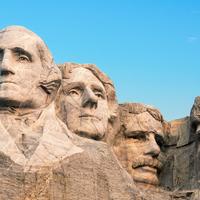THE STORY OF ABRAHAM LINCOLN. XIV.—PRESIDENT OF THE UNITED STATES.
In 1860 there were four candidates for the presidency.
The great Democratic Party was divided into two branches. One branch nominated Stephen A. Douglas. The other branch, which included the larger number of the slave-owners of the South, nominated John C. Breckinridge, of Kentucky.
The remnant of the old Whig Party, now called the "Union Party," nominated John Bell, of Tennessee. The Republican Party nominated Abraham Lincoln.
In November came the election, and a majority of all the electors chosen were for Lincoln.
The people of the cotton-growing states believed that, by this election, the Northern people intended to deprive them of their rights. They believed that the anti-slavery people intended to do much more than prevent the extension of slavery. They believed that the abolitionists were bent upon passing laws to deprive them of their slaves.
Wild rumors were circulated concerning the designs which the "Black Republicans," as they were called, had formed for their coercion and oppression. They declared that they would never submit.
And so, in December, the people of South Carolina met in convention, and declared that that state had seceded from the Union—that they would no longer be citizens of the United States. One by one, six other states followed; and they united to form a new government, called the Confederate States of America.
It had long been held by the men of the South that a state had the right to withdraw from the Union at any time. This was called the doctrine of States' Rights. The Confederate States at once chose Jefferson Davis for their President, and declared themselves free and independent.
In February, Mr. Lincoln went to Washington to be inaugurated. His enemies openly boasted that he should never reach that city alive; and a plot was formed to kill him on his passage through Baltimore. But he took an earlier train than the one appointed, and arrived at the capital in safety.
On the 4th of March he was inaugurated. In his address at that time he said: "In your hands, my dissatisfied countrymen, and not in mine, is the momentous issue of civil war. Your government will not assail you. You can have no conflict without being yourselves the aggressors. You have no oath registered in heaven to destroy the government; while I shall have the most solemn one to protect and defend it." The Confederate States demanded that the government should give up all the forts, arsenals, and public property within their limits. This, President Lincoln refused to do. He said that he could not admit that these states had withdrawn from the Union, or that they could withdraw without the consent of the people of the United States, given in a national convention.
And so, in April, the Confederate guns were turned upon Fort Sumter in Charleston harbor, and the war was begun. President Lincoln issued a call for 75,000 men to serve in the army for three months; and both parties prepared for the great contest.
It is not my purpose to give a history of that terrible war of four years. The question of slavery was now a secondary one. The men of one party were determined, at whatever hazard, to preserve the Union. The men of the other party fought to defend their doctrine of States' Rights, and to set up an independent government of their own. President Lincoln was urged to use his power and declare all the slaves free. He answered:
"My paramount object is to save the Union, and not either to save or destroy slavery. "If I could save the Union without freeing any slave, I would do it. If I could save it by freeing all the slaves, I would do it. If I could save it by freeing some and leaving others alone, I would also do that." At last, however, when he saw that the success of the Union arms depended upon his freeing the slaves, he decided to do so. On the 1st of January, 1863, he issued a proclamation declaring that the slaves, in all the states or parts of states then in rebellion, should be free.
By this proclamation, more than three millions of colored people were given their freedom.
But the war still went on. It reached a turning point, however, at the battle of Gettysburg, in July, that same year. From that time the cause of the Confederate States was on the wane. Little by little the patriots, who were struggling for the preservation of the Union, prevailed.

